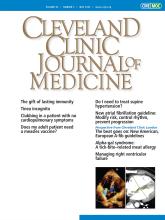ABSTRACT
Current Centers for Disease Control and Prevention guidelines state that patients with moderate to severe asthma may be at greater risk for more severe disease if infected with SARS-CoV-2; however, no published data support this suggestion. During this pandemic, it is recommended that patients with asthma continue taking all controller inhalers and other asthma medication as prescribed to prevent exacerbations and limit outpatient clinic and emergency room exposure. Symptoms that may differentiate COVID-19 from asthma exacerbations caused by another trigger may include fever, fatigue, anorexia, or myalgias. Patients with suspected or confirmed COVID-19 should avoid nebulizer treatments due to the risk of aerosolization.
ASTHMA AND COVID-19
Current Centers for Disease Control and Prevention guidelines state that patients with moderate to severe asthma could be at greater risk for more severe disease if infected with SARS-CoV-2. However, no published data support this suggestion. Early epidemiologic data from Wuhan, China, of 140 hospitalized patients with confirmed COVID-19 suggest that asthma and COPD are underrepresented as co-morbidities in this population.1 Additional epidemiologic studies support this finding with low rates of pre-existing respiratory disease in patients with COVID-19.2,3
Prior novel coronaviruses, SARS-CoV and MERS-CoV, did not appear to increase the risk of asthma exacerbations unlike seasonal coronaviruses, which have been linked to an increased risk.4,5
There has been concern about the use of oral corticosteroids to treat an asthma exacerbation during the pandemic. Studies looking at the use of oral corticosteroids with influenza infections and other coronavirus infections have found an association with increased mortality.6,7 One early observational study from Wuhan, China, suggested that patients with adult respiratory distress syndrome who received methylprednisolone had a reduced risk of death, but the results were not adjusted for confounders due to the small sample size.8 Corticosteroids are known to increase viral shedding with viral pneumonia, but the clinical implications of this are not clear.
The most important recommendation for patients during this pandemic is to continue taking all controller inhalers and other asthma medication as prescribed. This can prevent exacerbations and potentially be lifesaving. Maintaining good asthma control will also help limit outpatient clinic and emergency room exposure during the pandemic. The Global Initiative for Asthma has issued frequently asked questions (https://ginasthma.org/about-us/faqs/) about asthma management in the context of COVID-19.
There are some key symptom differences that caregivers can use to differentiate COVID-19 infection from asthma exacerbations caused by another trigger. The most common symptoms associated with COVID-19 include fever, fatigue, dry cough, anorexia, myalgia, and dyspnea. Most asthma exacerbations would not be expected to cause fever, fatigue, anorexia, or myalgias. Patients with typical asthma exacerbation symptoms and without other symptoms suggestive of COVID-19 should be treated with standard care. Oral steroids should be limited to the lowest possible dose for the shortest length of time. Asthma patients with COVID-19 infection should remain on their current asthma regimen. Oral corticosteroids can be used if COVID-19 is thought to be the cause of an asthma exacerbation, again limiting dose and length of treatment as much as possible.
For patients with suspected or confirmed COVID-19, nebulizer treatments should be avoided. Nebulization is an aerosol-generating procedure that can increase the risk of transmission. Metered-dose inhalers should be used instead whenever possible. If nebulizer treatments are necessary, healthcare workers who provide the treatment should use airborne precautions and wear personal protective equipment. Patients who need to administer a nebulizer treatment at home should do so in a location that limits exposure to other household members. Ideally, this should be a location where air is not recirculated into the home and where surfaces can be cleaned more easily, such as a patio, porch, or garage.
Footnotes
The statements and opinions expressed in COVID-19 Curbside Consults are based on experience and the available literature as of the date posted. While we try to regularly update this content, any offered recommendations cannot be substituted for the clinical judgment of clinicians caring for individual patients.
- Copyright © 2020 The Cleveland Clinic Foundation. All Rights Reserved.






